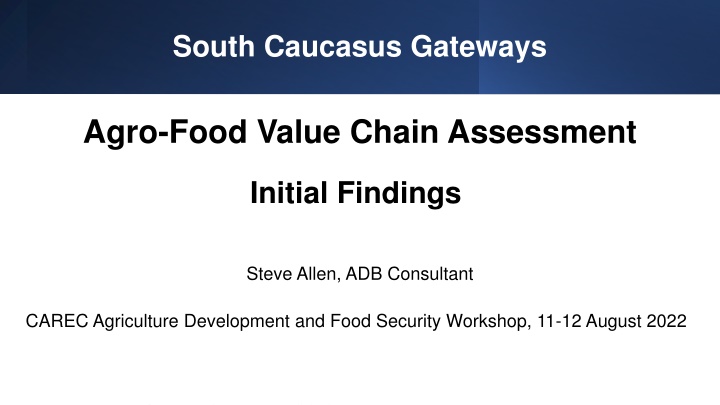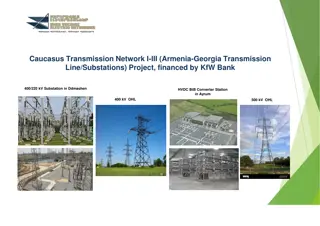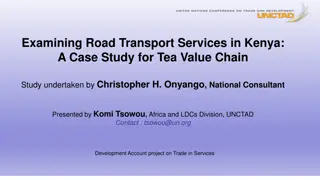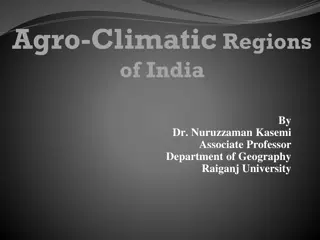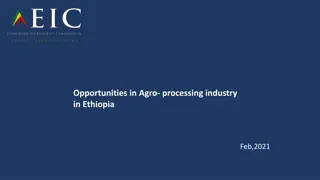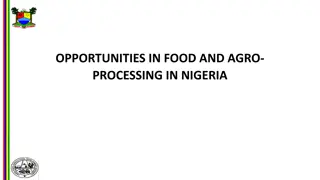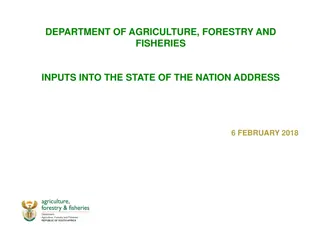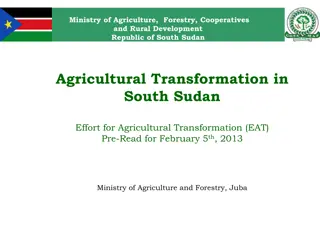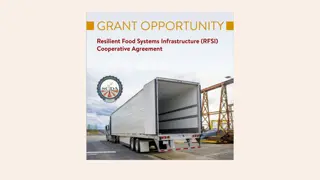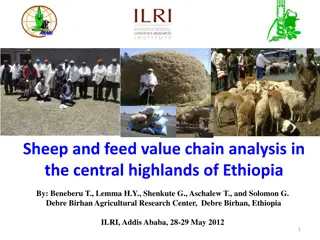South Caucasus Gateways Agro-Food Value Chain Assessment Overview
ADB's South Caucasus Gateways project aims to enhance agro-food value chains in Georgia, Azerbaijan, and Armenia, promoting food security and increasing exports. The assessment focuses on trade flows, logistics, and infrastructure investments to improve commercial food supply chains, benefiting farm incomes, production quality, and government revenue.
Download Presentation

Please find below an Image/Link to download the presentation.
The content on the website is provided AS IS for your information and personal use only. It may not be sold, licensed, or shared on other websites without obtaining consent from the author.If you encounter any issues during the download, it is possible that the publisher has removed the file from their server.
You are allowed to download the files provided on this website for personal or commercial use, subject to the condition that they are used lawfully. All files are the property of their respective owners.
The content on the website is provided AS IS for your information and personal use only. It may not be sold, licensed, or shared on other websites without obtaining consent from the author.
E N D
Presentation Transcript
South Caucasus Gateways Agro-Food Value Chain Assessment Initial Findings Steve Allen, ADB Consultant CAREC Agriculture Development and Food Security Workshop, 11-12 August 2022 INTERNAL. This information is accessible to ADB Management and staff. It may be shared outside ADB with appropriate permission.
South Caucasus Gateways Agro-Food Value Chain Assessment Introduction ADB s South Caucasus Gateways Technical Assistance Project supports regional transport, agro-food, and export competitiveness assessments The Regional Agro-Food Value-Chain Assessment aims to promote food security, increase exports, and determine options for transformational agro-logistics infrastructure investments The Assessment will assess and inter-regional trade flows and make recommendations on improving commercial food supply chains The team is assessing the capabilities and behaviour of agri-food value chains in Georgia, Azerbaijan and Armenia through discussions and in-depth interviews with private and public stakeholders INTERNAL. This information is accessible to ADB Management and staff. It may be shared outside ADB with appropriate permission.
South Caucasus Gateways Agro-Food Value Chain Assessment Strategic Overview and Opportunities Advancing the development of efficient trade flows between and through Georgia and Azerbaijan via the East West Corridor to the EU and the PRC. The middle corridor concept and Georgia as a transit HUB and re-export economy. Increased market access leading to expansion of agricultural exports (subject to standards harmonisation) and diversification of geographical markets away from dependency on Russia. The pull through effect of increased exports and supply chain activity leading to increased production, improved quality standards, and improved incomes (of farmers for example) and effective (and increased) land allocation/consolidation and use for agri-production. INTERNAL. This information is accessible to ADB Management and staff. It may be shared outside ADB with appropriate permission.
South Caucasus Gateways Agro-Food Value Chain Assessment Expected Benefits Improved Food security from improved farm incomes, diversified production (to higher value crops), and more land available to increase production Improved agri/food and logistics infrastructure to support efficient function of value and chill chains with storage to stabilise pricing fluctuations and enable unified trading platform Improved border control infrastructure investment and efficiencies and therefore faster transit for the regional strength of perishable product e.g. apricots, tomatoes Improved government revenue i.e. for transit and HUB countries such as Georgia INTERNAL. This information is accessible to ADB Management and staff. It may be shared outside ADB with appropriate permission.
South Caucasus Gateways Agro-Food Value Chain Assessment New Political Environment Affecting Agro Supply Chains The 44-day war of 2020 led to a move away from Azerbaijan agri-produce for key Russian markets to agri products from Iran also known as apricot wars The Russian invasion of Ukraine has led to an increased dependency on the Russian market for agri products and the shift of trade flows and agri logistics movement to the North South Corridor trading and logistics systems and Iranian agri produce (and wider). unsustainable pressure on the logistics and transport of perishable produce through the only export route to the key Russian market via Georgia, with congestion and delays of vehicles carrying perishable produce through LARS checkpoint (delays of up to 1 month). INTERNAL. This information is accessible to ADB Management and staff. It may be shared outside ADB with appropriate permission.
South Caucasus Gateways Agro-Food Value Chain Assessment New Political Environment Affecting Agro Supply Chains (cont d) The Russian invasion of Ukraine has led to significant increases in transportation costs and a lack of vehicle availability for regional producers to export. The result has led to producers attempting to keep produce in cold storage longer (and there is a scarcity of cold storage) and this is leading to significant product price variations. small traders and exporters cannot sustain their business, which leads to cash flow and income reduction for farmers. A combination that overtime will create food insecurity in the regions with small to medium farming communities. increased level of business for larger and in some cases monopolistic organisations in production, transport, and logistics who use their influence and gain commercial advantage by reducing the impact of the issues felt by other smaller exporters. INTERNAL. This information is accessible to ADB Management and staff. It may be shared outside ADB with appropriate permission.
South Caucasus Gateways Agro-Food Value Chain Assessment Short-Term Increase in Regional Trade Volumes The Russian invasion of Ukraine has led to significant increases in trade flows and transit flows for Georgia and Armenia in the short-term destined for the Russian market. The seaport of Poti (Georgia) and its road transport partners has seen bulk and containerised trade volumes increase by 320% in the last two months, with particular increases of imported perishable produce from Egypt i.e. bananas and potatoes and exports from PRC of tomato paste to Italy. Armenia has seen its perishable produce exports (including re-exports) increase dramatically as a result of the shift to the North-South Corridor transit routes. Multiple retailers are investing in local sourcing strategies and the corresponding development of distribution centres both for in-country and regional country supply of produce. Governments in the region are accelerating their strategies for increased local production INTERNAL. This information is accessible to ADB Management and staff. It may be shared outside ADB with appropriate permission.
South Caucasus Gateways Agro-Food Value Chain Assessment Medium Term Downside Risks Diversification away from the Russian market dependency will be more difficult Georgian Poti port is focused entirely on imports and does not see an export function for containerised and perishable produce through Georgia as viable, although they do see exports from China/Uzbekistan/Kazakhstan via Georgia as viable in the future Georgia s opportunity as an East West transit HUB for perishable produce appears to be closing, with the corresponding impact on the route for Turkish exports through Georgia and therefore reduced volumes. INTERNAL. This information is accessible to ADB Management and staff. It may be shared outside ADB with appropriate permission.
South Caucasus Gateways Agro-Food Value Chain Assessment Development Opportunities Overall there has never been a more important time a South Caucasus agreement of cooperation in agri produce (particularly for perishable products) potentially in the form of a unified platform for processing, storage and logistics, both digital and physical infrastructure To enable the East-West Corridor and Georgia HUB ambitions, benefits of the Poti/APM developments should be leveraged on imports of containerised product and, a case should be made for exports to the EU from Azerbaijan and wider. Turkish produce that transits through GEO could also benefit, unless Turkiye finds a solution to the opening of borders to access the North-South corridor. To support the development of domestic production in each country in the region, the strategy of multiple retailers e.g. Carrefour in Georgia to develop in-country and regional DC s should be supported. Where there are monopolistic systems in logistics and transport systems, particularly in the North-South corridor developments, the economic operator approach should be promoted, to look beyond pure commercial benefits to for example support of the farmers through standards development and agri-processing/packaging facilities. Ensuring a better price for farmers produce and strengthening the food security of the country. INTERNAL. This information is accessible to ADB Management and staff. It may be shared outside ADB with appropriate permission.
